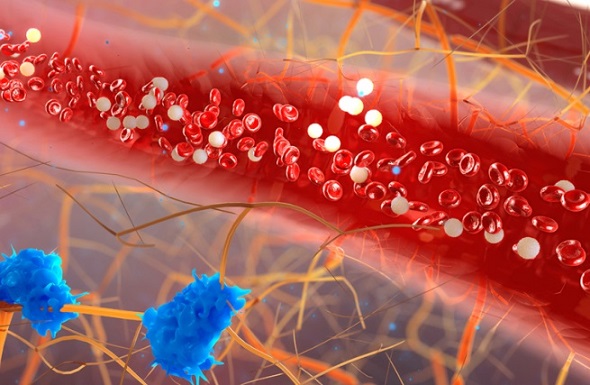Updated Diagnosis and Treatment Recommendations for ANCA-Associated Vasculitis-Important in The Current COVID-19 Era
Nikhil Prasad Fact checked by:Thailand Medical News Team Jan 25, 2025 2 months, 3 weeks, 5 days, 12 hours, 17 minutes ago
Medical News: Understanding ANCA-Associated Vasculitis
Anti-neutrophil cytoplasmic antibody (ANCA)-associated vasculitis (AAV) is a complex and rare autoimmune disease that causes inflammation of small blood vessels, leading to damage in various organs such as the kidneys, lungs, and nervous system. A number of studies and cases reports have shown that COVID-19 infections and the COVID-19 infections can trigger ANCA-associated vasculitis. Historically, AAV had a grim prognosis, often resulting in fatal outcomes. However, advancements in immunosuppressive therapies have transformed it into a manageable chronic condition. Despite these improvements, patients face challenges, including disease relapses and side effects from treatments.
 Updated Diagnosis and Treatment Recommendations for ANCA-Associated Vasculitis-Important in
Updated Diagnosis and Treatment Recommendations for ANCA-Associated Vasculitis-Important in
The Current COVID-19 Era
A recently published consensus document by experts from the fields of nephrology, internal medicine, and rheumatology provides updated guidelines for the diagnosis and treatment of AAV. This
Medical News report delves into these recommendations, which aim to optimize care and improve outcomes for patients with AAV.
Who Developed the Guidelines?
The recommendations were developed by a multidisciplinary team of 15 experts from prominent institutions across Spain, including Hospital Universitario 12 de Octubre, Hospital de Gran Canaria Doctor Negrín, and Hospital Clínic in Barcelona. These experts collaborated between 2023 and 2024 to compile the best available evidence and their clinical experience into a comprehensive set of guidelines.
Key Features of ANCA-Associated Vasculitis
AAV encompasses three major types:
-Granulomatosis with polyangiitis (GPA): Formerly known as Wegener’s granulomatosis, this condition often affects the respiratory tract and kidneys, presenting with granulomas and necrotizing inflammation.
-Microscopic polyangiitis (MPA): This form is characterized by widespread necrotizing vasculitis without granuloma formation, frequently involving the kidneys and lungs.
-Eosinophilic granulomatosis with polyangiitis (EGPA): Previously referred to as Churg-Strauss syndrome, it features eosinophilia, asthma, and vasculitis.
Diagnostic Recommendations
Identifying ANCA
The presence of ANCA is a cornerstone of AAV diagnosis. The guidelines emphasize the use of two techniques:
-Indirect immunofluorescence (IIF): This method identifies cytoplasmic (cANCA) and perinuclear (pANCA) patterns.
--linked immunosorbent assay (ELISA): ELISA detects specific antigens, such as proteinase 3 (PR3) and myeloperoxidase (MPO), providing greater specificity than IIF.&
lt;br />
Role of Biopsy
While ANCA testing is critical, a definitive diagnosis often requires tissue biopsy. Renal biopsy, in particular, offers high diagnostic yield and prognostic value. Histological findings typically show necrotizing glomerulonephritis with minimal immune deposits, a hallmark of AAV. In cases of pulmonary or nerve involvement, biopsies of the lungs or peripheral nerves may also provide valuable insights.
Imaging and Lab Tests
The guidelines recommend chest imaging for all patients, as pulmonary involvement may occur without overt symptoms. Additionally, routine blood and urine tests can reveal signs of systemic inflammation and kidney damage, such as elevated creatinine, hematuria, and proteinuria.
Treatment Strategies
Induction Therapy
The primary goal of induction therapy is to rapidly control inflammation and prevent organ damage. For severe cases involving major organs, the recommended treatment includes:
-Glucocorticoids: High doses are used initially, with a gradual taper to minimize side effects.
-Cyclophosphamide or rituximab: These immunosuppressants are highly effective in inducing remission.
-For less severe cases: methotrexate or mycophenolate mofetil may be used as alternatives.
Maintenance Therapy
Once remission is achieved, maintenance therapy aims to prevent relapses. Commonly used drugs include:
-Azathioprine or mycophenolate mofetil: These are effective for long-term disease control.
-Rituximab: Increasingly preferred for its efficacy in preventing relapses.
The recommended duration of maintenance therapy is at least 24 months, with some cases requiring treatment for up to five years based on relapse risk.
Advancements in Treatment
-Targeting B Lymphocytes and Complement Pathways
Recent insights into the role of B cells and the complement system in AAV pathogenesis have led to innovative therapies. Rituximab, which depletes B cells, has revolutionized treatment by reducing relapse rates. Additionally, complement inhibitors, such as avacopan, offer promising results by targeting inflammation while minimizing steroid-related side effects.
-Reducing Glucocorticoid Toxicity
Glucocorticoids, though effective, are associated with significant long-term risks, including diabetes, osteoporosis, and cardiovascular complications. The guidelines advocate for strategies to minimize steroid use, such as combining glucocorticoids with rituximab or other immunosuppressants.
Monitoring and Follow-Up
-Assessing Disease Activity
The Birmingham Vasculitis Activity Score (BVAS) remains the gold standard for monitoring AAV activity. This tool evaluates symptoms across multiple organ systems to determine disease severity and response to treatment.
-Identifying Relapses
Relapses are common in AAV, particularly in PR3-positive cases. Regular follow-ups are essential, focusing on:
-New or worsening symptoms
-Changes in ANCA levels
-Renal function and urine analysis
-Long-Term Management
The Vasculitis Damage Index (VDI) helps assess cumulative organ damage from disease activity and treatment side effects. This comprehensive evaluation informs decisions about therapy adjustments and supportive care.
Special Considerations
Pregnancy
AAV poses unique challenges during pregnancy. Immunosuppressive drugs, particularly cyclophosphamide, may harm the fetus. The guidelines recommend using safer alternatives, such as azathioprine, and close monitoring by a multidisciplinary team.
Infections
Patients with AAV are at increased risk of infections due to immunosuppression. Prophylactic measures, including vaccination and antimicrobial therapy, are crucial.
Conclusions
The updated guidelines for AAV diagnosis and treatment provide a robust framework for clinicians to manage this complex disease effectively. By integrating advanced diagnostic tools, personalized therapies, and proactive monitoring, these recommendations aim to improve patient outcomes while minimizing treatment-related complications.
Ultimately, the document highlights the importance of a multidisciplinary approach, combining expertise from nephrology, rheumatology, and internal medicine. As research continues to uncover new insights, future updates may further refine these strategies.
The study findings were published in the peer-reviewed journal: Revista de la Sociedad Española de Nefrología.
https://www.sciencedirect.com/science/article/pii/S201325142500001X
For the latest on ANCA-Associated Vasculitis, keep on logging to Thailand
Medical News.
Read Also:
https://www.thailandmedical.news/news/avacopan-offers-new-hope-for-patients-battling-the-deadly-autoimmune-disease-called-anca-associated-vasculitis
https://www.thailandmedical.news/news/new-insights-into-pulmonary-manifestations-of-anca-anti-neutrophil-cytoplasmic-antibodies-positivity
https://www.thailandmedical.news/news/a-new-look-at-anca-associated-vasculitis-and-its-impact-on-hearing
